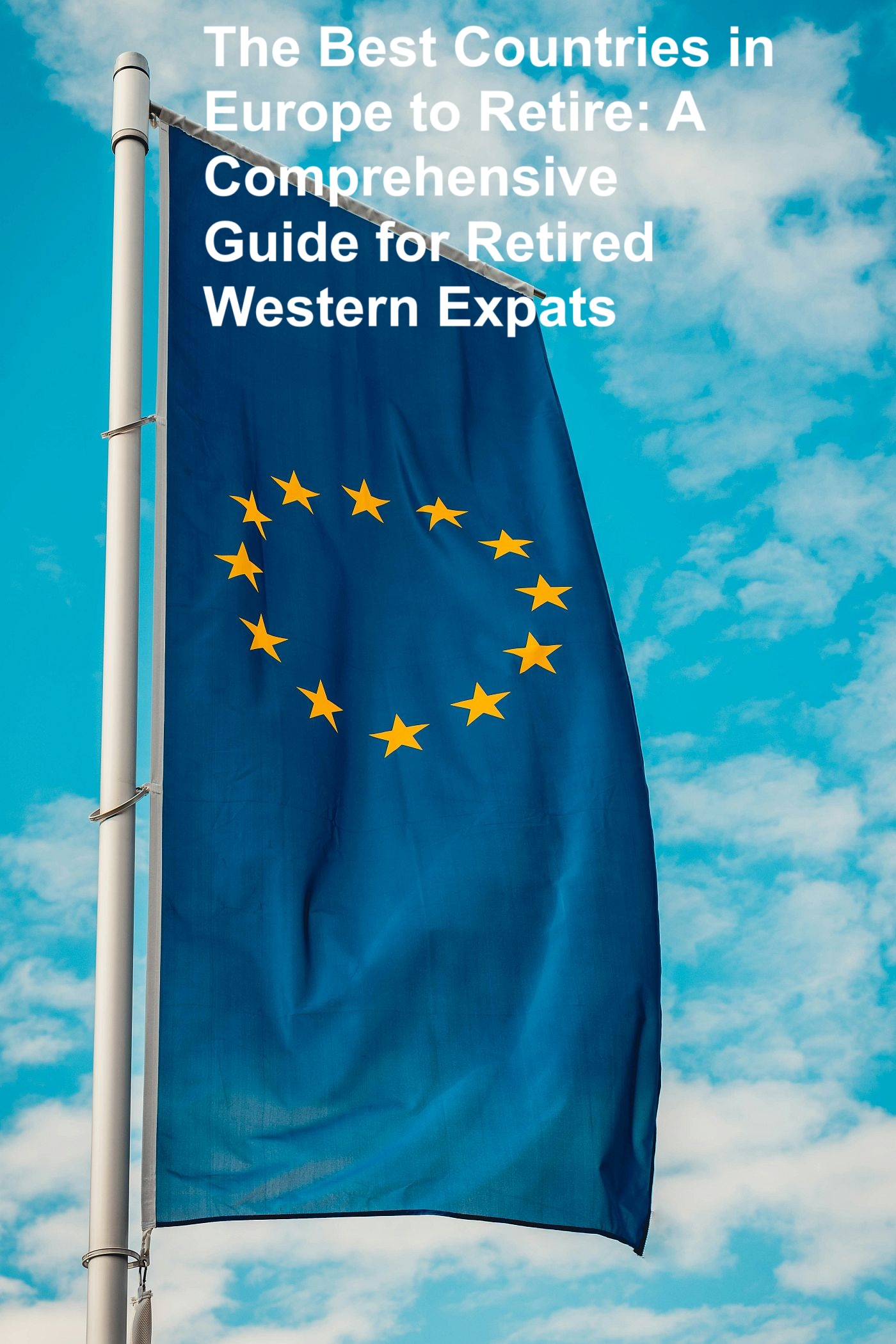The decision to retire marks a pivotal moment in life, a transition filled with the promise of freedom, exploration, and the pursuit of long-held dreams. For many Westerners – citizens of the United States, Canada, the United Kingdom, Australia, and beyond – this often involves considering a relocation, a chance to redefine their lifestyle and embrace a new chapter in an unfamiliar, yet alluring, land. Among the continents that beckon, Europe stands out as a particularly attractive destination, steeped in history, brimming with diverse cultures, and offering a quality of life that is often perceived as both richer and more affordable than what is available back home.
However, the sheer diversity of Europe can be overwhelming. From the sun-drenched beaches of the Mediterranean to the majestic peaks of the Alps, from the bustling metropolises of the West to the charming, undiscovered villages of the East, the continent presents a dizzying array of options. Each country possesses its own unique character, its own set of advantages and disadvantages, and its own particular appeal to different types of retirees. Navigating this complex landscape and identifying the perfect fit for your individual needs and aspirations can feel like a daunting task.
This book, “The Best Countries in Europe to Retire: A Comprehensive Guide for Retired Western Expats,” is designed to be your trusted companion on this exciting journey. It is born from a deep understanding of the unique challenges and opportunities that Western retirees face when considering a move to Europe, and it is meticulously crafted to provide you with the knowledge, insights, and practical guidance needed to make an informed and confident decision.
Our purpose is simple: to empower you to find your ideal European paradise. We recognize that “best” is a subjective term, deeply personal and intricately linked to individual preferences and priorities. What appeals to one retiree may hold little attraction for another. Therefore, this book does not attempt to prescribe a single “best” country. Instead, it aims to provide you with a comprehensive overview of a range of European nations, highlighting their strengths and weaknesses across a variety of key factors, allowing you to assess which best aligns with your own vision of retirement.
The target audience for this book is you: the discerning retiree or near-retiree, seeking not just a change of scenery, but a significant improvement in your quality of life. You are someone who values affordability, access to excellent healthcare, personal safety, a pleasant climate, and a vibrant culture. You are open to embracing new experiences, learning a new language (or perhaps not!), and immersing yourself in a different way of life. You are looking for a place where you can not only stretch your retirement savings further but also enrich your days with new passions, new friendships, and new adventures.
We understand that the decision to relocate to a new country is a momentous one, fraught with potential anxieties. Concerns about cost of living, healthcare systems, safety and security, language barriers, cultural differences, and the practicalities of immigration and residency are all perfectly valid. This book addresses these concerns head-on, providing you with detailed information and practical advice to alleviate your worries and empower you to move forward with confidence.
Before embarking on a detailed exploration of individual countries, it is crucial to understand the key considerations that typically weigh most heavily on the minds of retirees contemplating a move to Europe. These factors form the bedrock of your decision-making process and will help you to prioritize your needs and preferences.
Cost of Living: This is arguably the most significant factor for many retirees, particularly those on a fixed income. Europe offers a wide range of living costs, from the relatively expensive Scandinavian countries to the more affordable nations of Eastern and Southern Europe. We will delve into the specifics of housing costs, food prices, transportation expenses, utilities, and other essential expenditures, providing you with a clear picture of what you can expect to spend in each country. We will also explore strategies for maximizing your purchasing power and making your retirement savings go further.
Healthcare: Access to quality healthcare is another paramount concern for retirees. Europe boasts some of the best healthcare systems in the world, but the specifics of access and coverage can vary significantly from country to country. We will examine the structure of each nation’s healthcare system, including the availability of public and private healthcare options, the costs of insurance and medical treatments, and the quality of care provided. We will also address the specific needs of retirees with pre-existing medical conditions and provide guidance on navigating the complexities of international health insurance.
Safety and Security: Feeling safe and secure in your new home is essential for peace of mind. Europe is generally considered a safe continent, but crime rates and levels of security can vary. We will provide an overview of crime statistics, political stability, and other factors that contribute to overall safety in each country. We will also offer practical tips for staying safe and avoiding common scams.
Climate: The climate is a crucial factor influencing quality of life, particularly for retirees seeking relief from harsh winters or oppressive summers. Europe offers a diverse range of climates, from the mild, Mediterranean climate of Southern Europe to the colder, more continental climate of Northern and Eastern Europe. We will provide detailed information on average temperatures, rainfall, sunshine hours, and other climatic factors, helping you to choose a country that aligns with your preferred weather conditions.
Language: The ability to communicate effectively is essential for integration and social interaction. While English is widely spoken throughout Europe, learning the local language can significantly enhance your experience and make it easier to navigate daily life. We will assess the prevalence of English in each country and provide information on language learning resources. We will also discuss the challenges and rewards of learning a new language later in life.
Culture: Immersing yourself in a new culture is one of the most enriching aspects of retiring abroad. Europe is a continent of diverse cultures, each with its own unique traditions, customs, and values. We will provide an overview of the cultural landscape in each country, highlighting its history, art, music, cuisine, and social norms. We will also offer tips for adapting to a new culture and building meaningful relationships with locals.
Ease of Integration: The ease with which you can integrate into your new community will significantly impact your overall experience. Factors such as the friendliness of the locals, the availability of expat communities, the ease of obtaining residency and visas, and the bureaucracy involved in setting up a new life can all contribute to or detract from your sense of belonging. We will address these factors in detail, providing you with practical advice on navigating the complexities of immigration, finding accommodation, opening a bank account, and connecting with other expats.
This book is structured to provide you with a clear and comprehensive understanding of each country’s suitability for Western retirees. Each chapter will focus on a specific European nation, offering a detailed breakdown of the factors outlined above. We will utilize a standardized format to facilitate easy comparison across countries. Each chapter will include:
- An Overview: A brief introduction to the country, highlighting its key features and attractions.
- Cost of Living Analysis: A detailed breakdown of living expenses, including housing, food, transportation, healthcare, and utilities.
- Healthcare System Assessment: An evaluation of the quality and accessibility of healthcare services.
- Safety and Security Review: An overview of crime rates, political stability, and other safety-related factors.
- Climate Description: A summary of the country’s climate, including average temperatures, rainfall, and sunshine hours.
- Language and Culture Insights: An exploration of the local language and cultural norms.
- Ease of Integration Guide: Practical advice on immigration, residency, finding accommodation, and connecting with other expats.
- Pros and Cons Summary: A concise summary of the country’s advantages and disadvantages for Western retirees.
- Real-Life Anecdotes: Stories and experiences shared by Western expats who have already made the move.
By providing you with this wealth of information, we aim to equip you with the knowledge and confidence needed to make the right decision for your individual circumstances. This book is not just a guide; it is an investment in your future, a tool that will help you unlock the door to a fulfilling and rewarding retirement in the heart of Europe. So, embark on this journey with us, explore the possibilities, and discover your own European paradise.
Table of Contents (with page numbers)
Introduction……..6
Chapter 1: What to Consider When Relocating to Europe……..9
1.1 Cost of Living: Housing, Groceries, Utilities, and Entertainment……..9
1.2 Healthcare Systems: Quality, Accessibility, and Costs for Retirees……..12
1.3 Taxes: Income, Property, and Inheritance Taxes for Retirees……..14
1.4 Climate: Weather Preferences and Seasonal Variations……..18
1.5 Language and Communication: Ease of Learning the Local Language and English Proficiency……..20
1.6 Safety and Crime Rates: Personal Safety and Low Crime Areas……..22
1.7 Culture and Lifestyle: Social Norms, Friendliness, and Expat Communities……..24
1.8 Cuisine and Dining: Food Culture and Dietary Preferences……..26
1.9 Transportation and Infrastructure: Public Transport, Walkability, and Accessibility……..27
1.10 Visa and Residency Requirements: Ease of Obtaining Retirement Visas or Residency Permits……..30
Chapter 2: Top European Countries for Retirement……..34
2.1 Portugal……..34
2.1.1 Culture and Lifestyle: Friendly Locals, Rich History, and Expat-Friendly Communities……..34
2.1.2 Cost of Living: Affordable Housing and Daily Expenses……..36
2.1.3 Healthcare: High-Quality Public and Private Healthcare Options……..37
2.1.4 Taxes: Non-Habitual Resident (NHR) Tax Benefits for Retirees……..40
2.1.5 Language: Portuguese, but high English proficiency in expat areas……..42
2.1.6 Safety: Low crime rates and a peaceful environment……..43
2.1.7 Cuisine: Fresh Seafood, Mediterranean Diet, and Wine Culture……..45
2.1.8 Climate: Mild Winters and Sunny Summers, Especially in the Algarve……..47
2.1.9 Visa Requirements: Golden Visa and D7 Retirement Visa Options……..49
2.2 Spain……..51
2.2.1 Culture and Lifestyle: Vibrant festivals, siestas, and a relaxed pace of life………51
2.2.2 Cost of Living: Affordable outside major cities like Madrid and Barcelona………52
2.2.3 Healthcare: Excellent Public Healthcare System for Residents……..54
2.2.4 Taxes: Wealth Tax Considerations and Double Taxation Agreements……..56
2.2.5 Language: Spanish, but English is Widely Spoken in Tourist Areas……..58
2.2.6 Safety: Generally Safe, with Low Violent Crime Rates……..60
2.2.7 Cuisine: Tapas, Paella, and Regional Specialties……..62
2.2.8 Climate: Warm Mediterranean Climate in Coastal Areas……..65
2.2.9 Visa Requirements: Non-Lucrative Visa for Retirees……..67
Residency and Long-Term Stay……..67
2.3 Italy……..68
2.3.1 Culture and Lifestyle: Rich history, art, and a strong sense of community………68
2.3.2 Cost of Living: Affordable in smaller towns and rural areas………71
2.3.3 Healthcare: High-quality healthcare with a mix of public and private options………73
2.3.4 Taxes: Flat tax regime for retirees in certain regions………75
2.3.5 Language: Italian, but English is spoken in tourist areas………78
2.3.6 Safety: Low crime rates, especially in smaller towns………80
2.3.7 Cuisine: World-Renowned Food and Wine Culture……..82
2.3.8 Climate: Varied, from Mediterranean to Continental……..84
2.3.9 Visa Requirements: Elective Residency Visa for Retirees……..86
2.4 France……..87
2.4.1 Culture and Lifestyle: Sophisticated culture, art, and cuisine……..87
2.4.2 Cost of Living: Higher in cities like Paris, but affordable in rural areas……..89
2.4.3 Healthcare: One of the Best Healthcare Systems in the World……..92
2.4.4 Taxes: Wealth Tax and Income Tax Considerations……..94
2.4.5 Language: French, but English is spoken in tourist areas………97
2.4.6. Safety: Generally safe, with low crime rates in rural areas………100
2.4.7 Cuisine: Gourmet Food and Wine Culture……..102
2.4.8 Climate: Varied, from Mediterranean to Temperate……..104
2.4.9 Visa Requirements: Long-Stay Visa for Retirees……..105
2.5 Greece……..107
2.5.1 Culture and Lifestyle: Laid-back lifestyle, rich history, and island living………107
2.5.2 Cost of Living: Affordable, especially on the islands and in rural areas………109
2.5.3 Healthcare: Good public healthcare, with affordable private options………111
2.5.4 Taxes: Flat tax rate for pensioners under certain conditions………113
2.5.5 Language: Greek, but English is Widely Spoken in Tourist Areas……..116
2.5.6 Safety: Low Crime Rates and a Welcoming Environment……..119
2.5.7 Cuisine: Mediterranean Diet with Fresh Ingredients……..121
2.5.8 Climate: Warm Mediterranean Climate with Mild Winters……..123
2.5.9 Visa Requirements: Financially Independent Person Visa……..125
2.6 Croatia……..126
2.6.1 Culture and Lifestyle: Stunning coastline, historic cities, and a relaxed pace………126
2.6.2 Cost of Living: Affordable compared to Western Europe………128
2.6.3 Healthcare: Good public healthcare, with private options available………130
2.6.4 Taxes: Favorable tax treaties for retirees………131
2.6.5 Language: Croatian, but English is widely spoken in tourist areas………133
2.6.6 Safety: Very low crime rates and a peaceful environment………135
2.6.7 Cuisine: Fresh Seafood and Mediterranean Influences……..137
2.6.8 Climate: Mediterranean Along the Coast, Continental Inland……..139
2.6.9 Visa Requirements: Temporary Stay Permit for Retirees……..140
Chapter 3: Honorable Mentions……..142
3.1 Malta: English-speaking, Warm Climate, and Excellent Healthcare……..142
3.2 Cyprus: Affordable Living, Mediterranean Lifestyle, and Low Taxes……..145
3.3 Ireland: English-speaking, Friendly Culture, and High-Quality Healthcare……..148
Language and Culture: Bridging the Gap with Ease……..148
Healthcare: A System You Can Rely On……..148
Cost of Living: Balancing Affordability and Quality of Life……..149
Exploring the Emerald Isle: A Land of Natural Beauty and Cultural Riches……..149
Visa and Residency Requirements: Navigating the Process……..150
Finding Your Place in Ireland: Choosing the Right Location……..150
3.4 Slovenia: Affordable, Safe, and Stunning Natural Beauty……..151
Chapter 4: Practical Tips for Relocating……..153
4.1: Financial Planning: Managing Pensions, Savings, and Taxes……..153
4.2 Healthcare Enrollment: How to Access Public and Private Healthcare……..157
4.3 Housing: Renting vs. Buying, and Popular Expat Areas……..158
Renting vs. Buying: Weighing the Options……..159
Housing Market Insights in Europe:……..160
Popular Expat Areas in Europe:……..161
4.4 Learning the Language: Resources and Tips for Language Learning……..161
4.5 Building a Social Life: Joining Expat Communities and Local Groups……..163
4.5.1 The Role of Expat Communities……..163
4.5.2 Engaging with Local Groups and Activities……..164
4.5.3 Maintaining Connections with Family and Friends Back Home……..165
4.6 Legal Considerations: Understanding Local Laws and Residency Requirements……..166
Chapter 5: Conclusion……..171
5.1 Recap of Top Countries……..171
5.2 Final Advice……..172
5.3 Resources……..172
eBook Download
You will be provided with the link to download this book when you have completed the purchase below.
Book Reviews
Review 1
Reviewer’s Name: Margaret Whitaker
Biography
Margaret Whitaker is a seasoned travel writer and expatriate lifestyle consultant with over 20 years of experience living and working abroad. Having retired to the south of France in 2015, Margaret now dedicates her time to writing about the intricacies of expat life, offering practical advice to those considering a similar move. Her work has been featured in numerous international publications, including International Living and Expat Focus. Margaret is also the author of Living Abroad: A Practical Guide to Finding Your New Home, a best-selling book that has helped thousands navigate the challenges of relocation.
Review
The Best Countries in Europe to Retire: A Comprehensive Guide for Retired Western Expats is an indispensable resource for anyone contemplating retirement in Europe. The book’s meticulous organization and thorough research make it a standout in the crowded field of expatriate guides. From the very first chapter, the author demonstrates a deep understanding of the complexities involved in relocating, addressing critical factors such as cost of living, healthcare, and visa requirements with clarity and precision.
One of the book’s greatest strengths is its country-specific breakdowns. Each chapter delves into the unique cultural, financial, and logistical aspects of retiring in destinations like Portugal, Spain, and Italy. For instance, the section on Portugal not only highlights the country’s affordable housing and high-quality healthcare but also provides valuable insights into the Non-Habitual Resident (NHR) tax regime, a detail that could save retirees thousands of euros. Similarly, the chapter on Spain captures the essence of the country’s vibrant lifestyle while offering practical advice on navigating its wealth tax and residency requirements.
The inclusion of lesser-known destinations such as Croatia and Slovenia is a welcome addition, offering readers a broader perspective on retirement options. The practical tips in Chapter 4, particularly the advice on financial planning and healthcare enrollment, are especially useful for those unfamiliar with European systems.
What sets this guide apart is its ability to balance comprehensive information with an engaging, reader-friendly tone. The author’s attention to detail, coupled with real-world examples, ensures that readers are not only informed but also inspired to explore the possibilities of retiring in Europe.
Review 2
Reviewer’s Name: Dr. Jonathan Ellsworth
Biography
Dr. Jonathan Ellsworth is a retired professor of European Studies and a leading expert on cross-cultural adaptation. With a Ph.D. in Cultural Anthropology, Dr. Ellsworth has spent decades researching and writing about the social and cultural dynamics of expatriate communities. He has authored several academic papers and books, including Cultural Integration in a Globalized World and The Expat Experience: Navigating Life Abroad. Now residing in Tuscany, Italy, Dr. Ellsworth continues to advise retirees and expatriates on adapting to new cultural environments.
Review
The Best Countries in Europe to Retire: A Comprehensive Guide for Retired Western Expats is a masterfully crafted guide that addresses the multifaceted challenges of retiring abroad. The book’s structure is both logical and intuitive, beginning with a broad overview of relocation considerations before diving into detailed analyses of specific countries. This approach ensures that readers are equipped with the foundational knowledge needed to make informed decisions about their retirement destinations.
The chapter on “What to Consider When Relocating to Europe” is particularly commendable for its holistic approach. The author doesn’t merely focus on financial or logistical concerns but also emphasizes the importance of cultural and lifestyle factors. For example, the discussion on language and communication highlights the challenges of learning a new language while reassuring readers about the prevalence of English in many expat-friendly areas. Similarly, the section on cuisine and dining underscores the role of food in cultural integration, a topic often overlooked in similar guides.
The country-specific chapters are a treasure trove of information, offering nuanced insights into the unique advantages and challenges of each destination. The section on Italy, for instance, captures the country’s rich cultural heritage and strong sense of community while providing practical advice on navigating its healthcare system and tax regime. The inclusion of visa requirements and residency options for each country is particularly valuable, as this information is often difficult to find in a single, reliable source.
The book also excels in its treatment of practical relocation tips. Chapter 4’s advice on financial planning, housing, and building a social life is both comprehensive and actionable. The emphasis on joining expat communities and engaging with local groups is especially insightful, as it addresses the often-overlooked emotional and social aspects of relocation.
Overall, this guide is a must-read for anyone considering retirement in Europe. Its blend of practical advice, cultural insights, and detailed country profiles makes it an invaluable resource for navigating the complexities of expatriate life.








